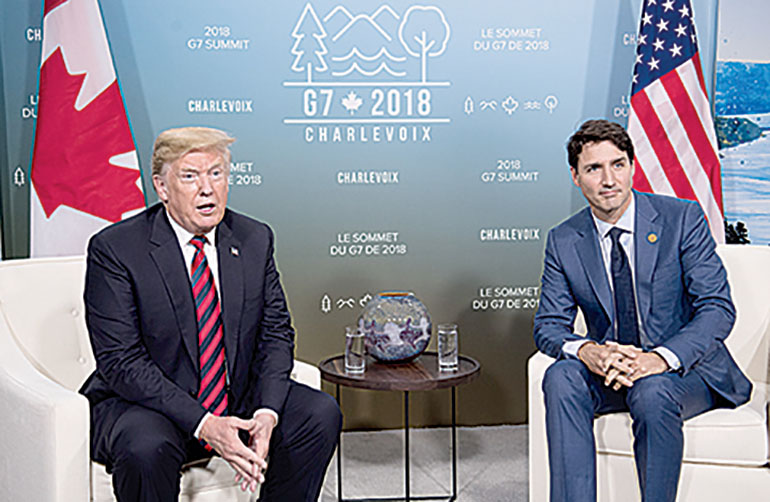
OTTAWA: Canadian
Prime Minister Justin Trudeau on Friday accused China of ignoring a former
Canadian envoy's "diplomatic immunity" when it detained him last
month along with a compatriot. Michael Kovrig was arrested on December 10 in
China, after taking a leave from his diplomatic posting to work for the
International Crisis Group (ICG) think tank.
China detained
former diplomat Michael Kovrig and businessman Michael Spavor last month, accusing
them both of activities that "endanger China's security"-a phrase
often used by Beijing when alleging espionage. Their detentions are thought to
be in retaliation for Canada's arrest on a US request of Huawei vice president
Meng Wanzhou, who is accused of violating Iran sanctions.
"It is
unfortunate that China has arbitrarily and unfairly detained two Canadian
citizens, and indeed in one of the cases is not respecting diplomatic
immunity," said Trudeau. "This is something that we are engaged right
now both with Chinese officials and with our partners around the world where
there is a concern for the need for all countries to do like Canada and to
respect the rule of law and the independence of our judicial processes."
It was the first
public comment on Kovrig's status. Officials previously said he was on an
unpaid leave from his Canadian government job. According to the Vienna
Convention, persons carrying a diplomatic passport enjoy immunity when they are
abroad. Trudeau's statement therefore suggests that Kovrig carried such a
passport while on sabbatical, which is possible if authorized by Canada's
foreign ministry.
Ottawa has
called-backed by Australia, Britain, France, Germany, the European Union and
the United States-for the Canadians' immediate release. On Thurday, the
Netherlands, Latvia, Lithuania, and Estonia also added their voices of support
for Canada. China's Ambassador to Canada Lu Shaye, in a letter to a Canadian
newspaper on Wednesday, accused Ottawa and its allies of applying a
"double standard" in criticizing the detentions of Kovrig and Spavor
while defending Meng's arrest, attributing this to "Western egotism and
white supremacy."
Voting rights
In other news,
Canada's top court on Friday confirmed the voting rights of expatriates by
ruling that a law-already repealed last month-wrongly denied those living
abroad for five years or more a chance to cast a ballot. In a 5-2 decision, the
Supreme Court said the regulation infringed on Canadian expats' constitutional
right to vote, which Chief Justice Richard Wagner called a "fundamental
political right" and "a core tenet of our democracy."
Prime Minister
Justin Trudeau's Liberal government had already reformed the elections act,
doing away with the five-year provision last month. But the ruling was still
widely viewed as important in that it would prevent future governments from
bringing back the restrictions. The impugned sections of the act had been on
the books since 1993 but had only been used during the previous Tory government's
decade in office, to 2015.
The law was
challenged by two Canadians living in the United States. They both tried to
vote in the 2011 election but were rebuffed due to the residency requirement.
Over the past century, Canada has expanded the right to vote, originally
restricted to property-owning men aged 21 or older, to women, racial
minorities, persons once described as suffering from a "mental
disease," prison inmates and soldiers and diplomatic staff posted abroad.
Residence, the court noted, was one of the last restrictions on the right to
vote in Canadian federal elections.
The majority of
the court said the government failed to justify the measure, and called it
overly broad. "While it seeks to bar people from voting who lack a sufficient
connection to Canada, no correlation has been shown between, on the one hand,
how long a Canadian citizen has lived abroad and, on the other hand, the extent
of his or her subjective commitment to Canada," said the ruling.
"Many non-resident citizens maintain deep and abiding connections to
Canada through family, online media and visits home, and by contributing taxes
and collecting social benefits," the justices noted.
In a dissenting
opinion, Justices Suzanne Cote and Russell Brown called the five-year rule
"a reasonable limit" on voting rights. "Opening the vote to
long-term non-residents... would be a regressive development, undermining the
longstanding and entirely salutary practice in Westminster parliamentary
democracies of privileging local connections in deciding who may elect local
representatives," they wrote. According to the government, an estimated
three million Canadians or nine percent of the population live abroad.
Expatriate voting has historically been low. - AFP










